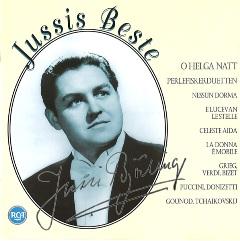Jussi Björling - Jussis Beste (1995)
Jussi Björling - Jussis Beste (1995)

1. А. Аdam - O Helga Natt, Stokholm, 8.02.1959 2. G. Bizet - Au fond du temple saint , New York, 30.11.1950 3. G. Verdi - Se quel guerriero io fossi; Celeste Aida / Rome, july 1955 4. G. Verdi - La donna e mobile / Rome, july 1956 г. 5. P. Mascagni - Siciliana: O Lola/ New York, january 1953 г. 6. Ch. Gounod "Faust" - Salut demeure chaste et pure / New York, 9.03.1951 7. G. Puccini "Tosca" - E lucevan le stelle / Rome, july 1957 8. E. Grieg - En Svane Op.25 Nr.2/ New York, 11.01.1952 9. E. Grieg - En Drøm Op.48 Nr. 6 / New York, 11.01.1952 10. G. Verdi "La Boheme" - Che gelida Manina / New York, 13.01.1951 11. A. Borodin "Prince Igor" - Vladimirs Resitativ & Cavatina / Stokholm, 23.01.1957 12. P. Tchaikovsky "Еugeny Onegin" - Förbi, Förbi - Lenskij's Arie / Stokholm, 22.01.1957 13. G. Donizetti "L’Eliksir D’Amore" - Una furtiva lagrima / Stokholm, 23.01.1957 14. G. Puccini "Tosca" - O dolci mani / Rome, july 1957 15. G. Puccini "Tosca" - Recondita armonia / Rome, july 1957 16. R. Leoncavallo "I Pagliacci" Vesta la giubba / New York, 9.03.1951 17. G. Puccini "Turandot" - Signore, ascolta! ... Non piangere, Liu/ Rome, july 1959 18. G. Puccini "Turandot" - Nessun Dorma / Rome, july 1959 Kungliga Hovkapellet, Stockholm; dir. - Nils Grevillius (1, 11-13) Roma Operas Kor & Orkester, dir. - Erich Leinsdorf (17, 18) RCA Victor Orchestra, dir. - Renato Cellini (2, 5, 6, 10, 16) Roma Operas Kor & Orkester, dir. - Jonel Perlea (3, 4, 7, 14, 15) Frederick Schauweeker - piano (8, 9)
Jussi Björling was one of the most admired tenors of the twentieth century. He was never an effective actor on stage nor was he particularly handsome, but his excellent technique, scrupulous musicianship, and beautiful voice, with its powerful and focused top, made him one of the most-demanded stars of his day. Those with a fondness for such comparisons consistently called him "the second Caruso" or "the Swedish Caruso." Some found his rather smooth timbre inexpressive, particularly those used to Gigli's frequent use of sobs and other extra-musical effects, but others found that its directness, combined with his sensitivity to phrasing, made the music all the more expressive. At times he did have a tendency to sing slightly sharp, but to listeners without an acute sense of pitch it was almost undetectable.
Björling came from a musical family and began his career early -- his singing debut came at the age of five. His father, David, was a fine singer who formed the Björling Male Quartet with the older three boys, Olle, Jussi, and Gosta. They performed world-wide, made some recordings for American Columbia (including Jussi's first solo recordings), and settled in the United States in 1920. While they were wildly popular, they had financial problems, and when David Björling died in 1926, the quartet broke up.
In 1928, Jussi succeeded in getting an audition with Karl-Martin Oehmann. Oehrmann was so impressed that he recommended Björling to the Royal Opera in Stockholm, where he was given a stipend for room, board, studies at the conservatory, and a new suit. Two years later, Björling made his operatic debut as the Lamplighter in Puccini's Manon Lescaut and took on his first leading role a month later as Don Ottavio in Mozart's Don Giovanni. In 1933, he first sang the role of Romeo in Gounod's Romeo et Juliette, a role with which he would later become strongly associated. He met Anna-Lisa Berg, a lyric soprano, while at the Swedish Music Academy and Royal Opera school, and their marriage lasted until his death, despite the alcoholism that troubled his entire adult life.
He made his Vienna debut in 1936, his United States debut in a Carnegie Hall concert in 1937 (his United States operatic debut was a short time later that same year, as the Duke of Mantua, in Chicago), and his Salzburg debut as Don Ottavio in Don Giovanni. In 1936, he also began a long recording association with HMV. He made his Met debut in 1938 in La Bohème and in 1939 his Covent Garden debut as Manrico. Like those of most other opera singers, his international career was limited by World War II, but when the war was over, he again sang all over the world. In 1950, he took the title role in the famous Met production of Verdi's Don Carlo that inaugurated Rudolf Bing's administration. As his career expanded and he was able to be more selective about his stage roles, he began to limit his repertoire to the major Italian and French lyric roles, with a few forays into the lyrico-spinto repertoire. However, he recorded and performed in concert excerpts from many roles he had never explored on stage, as well as lieder and his beloved Swedish songs.
In March of 1960, Björling had a heart attack before a performance at Covent Garden. While he chose to finish the performance, his symptoms became still more serious, and he and his family returned to Sweden, where he died that September. --- Anne Feeney, Rovi
download: uploaded anonfiles mega 4shared mixturecloud yandex mediafire ziddu
Zmieniony (Poniedziałek, 19 Sierpień 2013 16:14)








